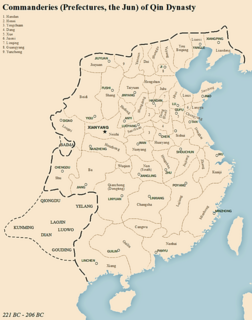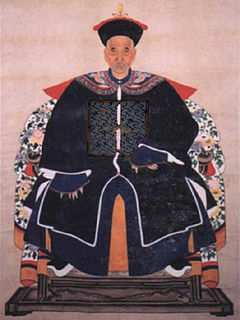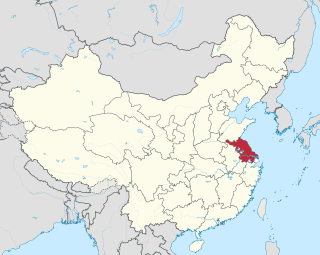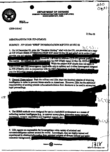
China proper, Inner China or the Eighteen Provinces was a term used by Western writers on the Manchu Qing dynasty to express a distinction between the core and frontier regions of China. There is no fixed extent for China proper, as many administrative, cultural, and linguistic shifts have occurred in Chinese history. One definition refers to the original area of Chinese civilization, the Central Plain ; another to the "Eighteen Provinces" system of the Qing dynasty. There is no direct translation for "China proper" in the Chinese language due to differences in terminology used by the Qing to refer to the regions and the expression is controversial among scholars, particularly in China, due to national territorial claims.

The Chinese sovereign is the ruler of a particular period in ancient China, and later imperial China. Several titles and naming schemes have been used throughout history.

Zhao is a Chinese surname, ranking as the 7th most common surname in Mainland China and carried mainly by people of Mandarin-speaking regions. Zhao is the 1st surname in the famous Hundred Family Surnames – the traditional list of all Chinese surnames – because it was the emperor's surname of the Song Dynasty (960–1279) when the list was compiled.

Aisin Gioro was the imperial clan of Manchu emperors of the Qing dynasty. The House of Aisin Gioro ruled China from 1644 until the Xinhai Revolution of 1911-12, which established a republican government in its place. The word aisin means gold in the Manchu language, and "gioro" is the name of the Aisin Gioro's ancestral home in present-day Yilan, Heilongjiang Province. In Manchu custom, families are identified first by their hala (哈拉), i.e. their family or clan name, and then by mukūn (穆昆), the more detailed classification, typically referring to individual families. In the case of Aisin Gioro, Aisin is the mukūn, and Gioro is the hala. Other members of the Gioro clan include Irgen Gioro (伊爾根覺羅), Šušu Gioro (舒舒覺羅) and Sirin Gioro (西林覺羅).
Heqin, also known as marriage alliance, refers to the historical practice of Chinese emperors marrying good looking princesses—usually members of minor branches of the royal family—to rulers of neighboring states. It was often adopted as an appeasement strategy with an enemy state that was too powerful to defeat on the battlefield. The policy was not always effective. It implied an equal diplomatic status between the Chinese emperor and the foreign ruler. As a result, it was controversial and had many critics.
Taizu is an imperial temple name typically used for Chinese emperors who founded a particular dynasty. It may refer to:
The grand chancellor, also translated as counselor-in-chief, chancellor, chief councillor, chief minister, imperial chancellor, lieutenant chancellor and prime minister, was the highest-ranking executive official in the imperial Chinese government. The term was known by many different names throughout Chinese history, and the exact extent of the powers associated with the position fluctuated greatly, even during a particular dynasty.

The Siku Quanshu, variously translated as the Complete Library in Four Sections, Imperial Collection of Four, Emperor's Four Treasuries, Complete Library in Four Branches of Literature, or Complete Library of the Four Treasuries, is the largest collection of books in Chinese history. The complete encyclopedia contains an annotated catalogue of 10,680 titles along with a compendiums of 3,593 titles. The Siku Quanshu ended up surpassing the Ming dynasty's 1403 Yongle Encyclopedia in size, which was China's largest encyclopedia prior to the creation of the Siku Quanshu.

The Emperor and His Brother is a 1981 Hong Kong wuxia film based on Louis Cha's novel The Book and the Sword. Produced by the Shaw Brothers Studio, the film was directed by Chor Yuen and starred Ti Lung, Jason Pai and Lo Lieh in the leading roles.

A conquest dynasty in the history of imperial China refers to a dynasty established by non-Han peoples that ruled parts or all of the China proper, most notably the Mongol-founded Yuan dynasty and the Manchu-founded Qing dynasty.

The Wen Xuan, or Selections of Refined Literature, is one of the earliest and most important anthologies of Chinese poetry and literature, and is one of the world's oldest literary anthologies to be arranged by topic. It is a selection of what were judged to be the best poetic and prose pieces from the late Warring States period to the early Liang dynasty, excluding the Chinese Classics and philosophical texts. The Wen Xuan preserves most of the greatest fu rhapsody and shi poetry pieces from the Qin and Han dynasties, and for much of pre-modern history was one of the primary sources of literary knowledge for educated Chinese.
The name Dzungar people, also written as Zunghar, referred to the several Oirat tribes who formed and maintained the Dzungar Khanate in the 17th and 18th centuries. Historically they were one of major tribes of the Four Oirat confederation. They were also known as the Eleuths or Ööled, from the Qing dynasty euphemism for the hated word "Dzungar", and also called "Kalmyks". In 2010, 15,520 people claimed "Ööled" ancestry in Mongolia. An unknown number also live in China, Russia, and Kazakhstan.

The Story of Han Dynasty is a Chinese television series based on the events in the Chu–Han Contention, an interregnum between the fall of the Qin dynasty and the founding of the Han dynasty in Chinese history. The series was first broadcast on CCTV in China in 2003. Directed by Wei Handao, the series starred Hu Jun, Xiao Rongsheng, Jacklyn Wu, Kristy Yang, Wang Gang and Li Li-chun.
Aisin-Gioro Ulhicun is a Chinese linguist of Manchu ethnicity who is known for her studies of the Manchu, Jurchen and Khitan languages and scripts. She is also known as a historian of the Liao and Jin dynasties. Her works include a grammar of Manchu (1983), a dictionary of Jurchen (2003), and a study of Khitan memorial inscriptions (2005), as well as various studies on the phonology and grammar of the Khitan language.
The New Qing History is a school of thought that gained prominence in the United States in the mid-1990s by offering a wide-ranging revision of history of the Manchu Qing dynasty. Earlier historians had emphasized the power of Han Chinese to “sinicize” their conquerors, that is, to assimilate and make them Chinese in their thought and institutions. In the 1980s and early 1990s, American scholars began to learn Manchu and took advantage of newly opened Chinese- and Manchu-language archives. This research found that the Manchu rulers were savvy in manipulating their subjects and from the 1630s through at least the 18th century, emperors developed a sense of Manchu identity and used Central Asian models of rule as much as they did Confucian ones. According to some scholars, at the height of their power, the Qing regarded "China" as only a part, although a very important part, of a much wider empire that extended into the Inner Asian territories of Mongolia, Tibet, the Northeast and Xinjiang, or Chinese (Eastern) Turkestan.

The Qing dynasty in Inner Asia was the expansion of the Qing dynasty's realm in Inner Asia in the 17th and the 18th century AD, including both Inner and Outer Mongolia, Manchuria, Tibet, Qinghai and Xinjiang. Wars were fought primarily against the Northern Yuan dynasty and the Dzungar Khanate (1687–1758). Even before the conquest of China proper, the Manchus had controlled Manchuria and Inner Mongolia, with the latter being previously controlled by the Mongols under Ligdan Khan. After suppressing the Revolt of the Three Feudatories and the conquest of Taiwan as well as ending the Sino-Russian border conflicts in the 1680s, the Dzungar–Qing War broken out. This eventually led to Qing conquests of Outer Mongolia, Tibet, Qinghai and Xinjiang. All of them became part of the Qing Empire and were garrisoned by Qing forces, but they were governed through several different types of administrative structure and also retained many of their existing institutions. Furthermore, they were not governed as regular provinces, but instead were supervised by the Lifan Yuan, a Qing government agency that oversaw the empire's frontier regions.

The Four is a 2015 Chinese television series starring Hans Zhang, Yang Yang, William Chan and Mao Zijun. It is the latest adaption of Woon Swee Oan's novel Si Da Ming Bu. The series aired on Hunan TV from 17 March to 23 June 2015.
























